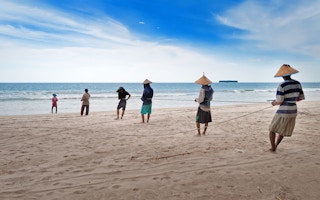If you have a $15 billion market growing at eight per cent a year on the one hand, and a 20 million tonne supply with enormous capacity for growth on the other, then commercial logic says this ought to be a perfect marriage. If you also have political will on the demand and the supply side to build capacity and infrastructure, added to low labour costs and one of the world’s largest producer bases, then this marriage would seem to be made in heaven.
To continue reading, subscribe to Eco‑Business.
There's something for everyone. We offer a range of subscription plans.
- Access our stories and receive our Insights Weekly newsletter with the free EB Member plan.
- Unlock unlimited access to our content and archive with EB Circle.
- Publish your content with EB Premium.
But for the fisheries trade between the European Union (EU) and Indonesia, there is a missing link. The EU is the world’s largest (and still growing) market for fisheries products. Indonesia is the world’s second largest producer. Yet Indonesia currently accounts for just 1.3 per cent of the fish products imported by the EU. So the best way to describe the fisheries trade between the EU and Indonesia is a missed opportunity.
Why is this?
There are four barriers to EU market entry: sustainability, quality, legality and tariffs. Businesses need to grapple with the first two barriers but the second two require intervention by policymakers – something that President Jokowi has already indicated he is willing to do.
Demonstrating sustainability – in its widest sense – is central to any realistic attempt to engage with the EU. At both the legislative and commercial levels, sustainability policies are among the most robust in the world. Yet Indonesian marine and aquaculture business infrastructures have not to date engaged with the latest trends in sustainable fishing and processing, and are not part of the forums that set European standards, nor do they tend to comply with those standards. This must change if Indonesian fisheries businesses want to penetrate the European market.
Quality has been another major challenge. The EU imposes strict regulations on the health controls of fisheries products. Fish products can only be imported with health certification, and comprehensive labelling. For decades, fish imports from Indonesia have been excluded due to Indonesian producers’ inability to meet the EU’s sanitary and phyto-sanitary (SPS) standards.
Thirdly, legality. The EU’s catch certification scheme mandates that all fish imports must be accompanied by a catch certificate to demonstrate that the original fish was sourced legally. Illegal, unregulated and unreported (IUU) fishing has hit the headlines in Indonesia since Jokowi came to office, partly as a result of the tough stance the government has taken on sinking illegal fishing vessels.
However, sinking ships can only be a small part of the solution: the real answer is to improve governance in the fishing industry, in the same way as similar efforts have been made in the forestry sector over the last few years. Systems and processes must be improved, and efforts made to minimise corruption and abuse.
“
The EU is the world’s largest (and still growing) market for fisheries products. Indonesia is the world’s second largest producer. Yet Indonesia currently accounts for just 1.3 per cent of the fish products imported by the EU. So the best way to describe the fisheries trade between the EU and Indonesia is a missed opportunity.
Finally, although Indonesia still enjoys preferential trade status with the EU under the Generalised System of Preferences (GSP), a number of fisheries exports still face high tariff rates when entering the EU, particularly compared with other Asian competitors. Should negotiations begin on a new Comprehensive Economic Partnership Agreement (CEPA) between the EU and Indonesia, this would present an opportunity for the Indonesian fishing industry to ask its government to secure lower tariffs for fish products.
The solutions are therefore clear, if challenging.
Since taking office, Jokowi has made developing Indonesia into a global maritime axis a priority.
Alongside security and infrastructure, the sustainable economic development of the fishing industry must be the key plank of this ‘Blue Economy’ vision. Realising it will require action by a wide range of stakeholders to convert the challenges into the opportunities that are so clearly present.
The Jokowi administration is right to be prioritising the maritime economy and needs to act. However, businesses also need to develop a new approach to quality and sustainability.
Sustainability standards are a ‘must have’ for major European retailers and brand owners. NGO and media scrutiny, and consumer demand for high standards, have increased massively in the last decade. Clear evidence of chain of custody, sustainable stock management, stock health, internationally accepted certification of products, and fair working conditions, are all, therefore, ‘must haves’ on the supply side too.
Fisheries are among Indonesia’s greatest natural resources. The country’s other significant resource – forestry – has suffered considerable criticism, with major overseas customers imposing strict supply chain sustainability polices, and delisting businesses that do not comply. The country as a whole continues to suffer from – justifiable - accusations of deforestation.
There is change here of course, with some businesses in the region making great strides in sustainability and conservation. For the fisheries sector to avoid the same fate, change needs to happen proactively, and not as a result of damaged reputation and commercial slippage. Indonesia’s seafood industry, and indeed that of South East Asia as a whole, cannot afford to be seen as ‘toxic’, like its predecessors in palm oil and other sectors.
If therefore sufficient political and commercial will to manage one of Indonesia’s great natural resources effectively, efficiently and above all ethically and sustainably, can be harnessed, then the challenges we outline here can be turned into what they should be – an opportunity that benefits business, society, and the country’s reputation as a whole.
Brendan May is Chairman of Robertsbridge, a global sustainability advisory firm. He is a former Chief Executive of the Marine Stewardship Council (MSC). Benjamin Wegg-Prosser is Managing Partner of Global Counsel, a consultancy that helps business leaders solve problems in a global market.











